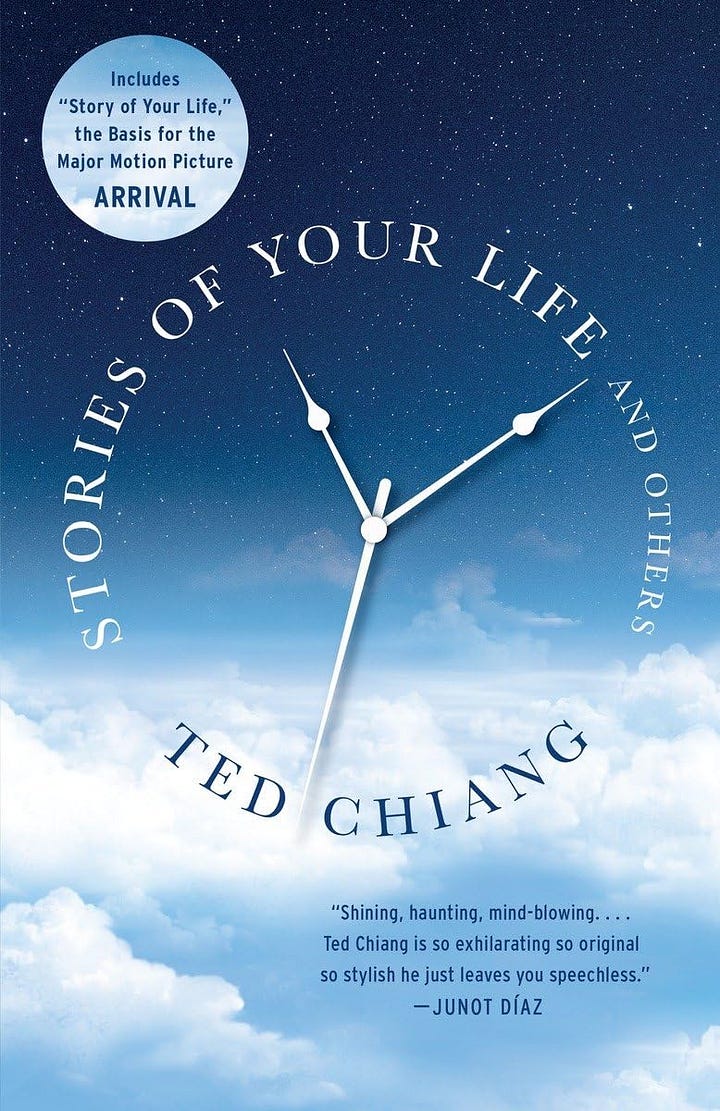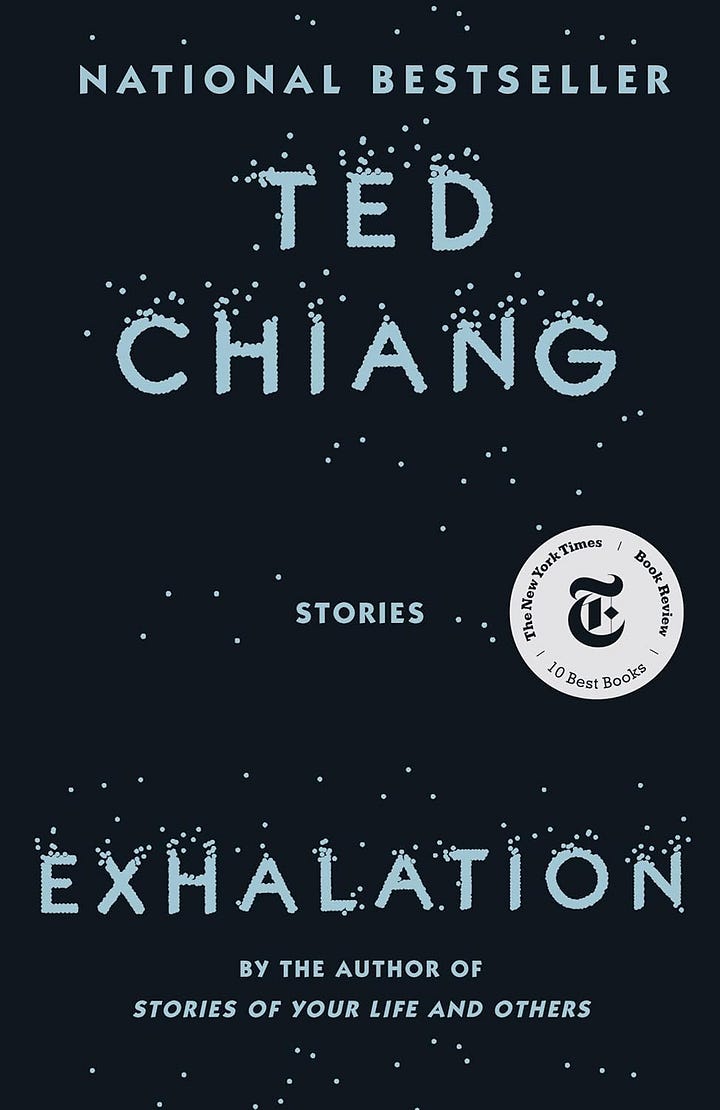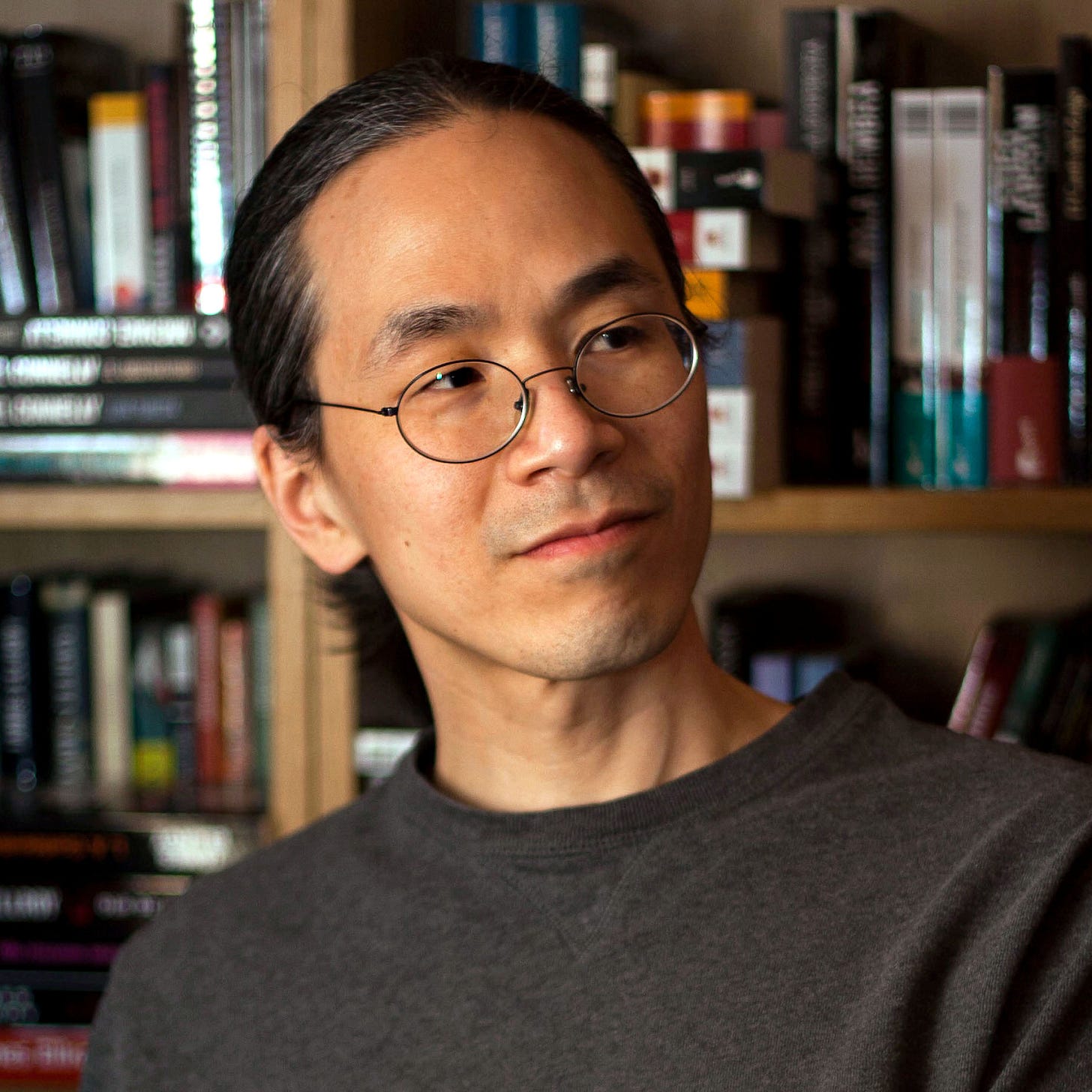Ted Chiang: The Secret Third Thing
I really like Ted Chiang’s writing.
I think he's probably the best science fiction short story writer alive, and possibly the best short story writer, period.
I've read every one of his stories at least twice, and The Merchant and the Alchemist's Gate more like seven times. I’ve noticed many of his readers, including some of his most positive reviewers1, miss one key point or another of his works, and thus don't fully appreciate his genius.
This review covers what he does extremely well, especially unique elements that other science fiction writers have not done as well, or at all.
He Writes “True” Science Fiction
Science fiction critics often divide the genre into:
"hard" science fiction: aka engineering fiction, stories built on scientifically accurate extrapolations of real physics and technology (think Arthur C. Clarke)
"soft" science fiction: aka science fantasy, which uses scientific trappings as window dressing for character-driven or sociological stories (think Star Wars).
Ted Chiang has written stories plausibly categorized as either, but more excitingly, many of his stories are neither. He often writes what I think of as true science fiction, where the principles of science themselves are meaningfully different from our world, but still internally consistent.
In Omphalos, Young Earth Creationism is empirically true2. Astronomers can only see light from stars 6,000 light-years away. Fossilized trees have centers with no rings. The first God-created humans lack belly buttons. The scientists in that story keep discovering multiple independent lines of evidence that converge on creationism: because in that universe, they're simply correct.
In Seventy-Two Letters, technology springs from Jewish Kabbalah. Golems and divine names drive industrial progress in a steampunk world3.
Excitingly, he does this not just with natural sciences but social sciences as well. In Story of Your Life, strong Sapir-Whorf (the idea that language significantly constrains thought) isn't a largely discredited linguistic hypothesis, but the key to navigating First Contact with alien minds that experience past and future as equally present.
This comes up in his other stories4 as well:
In Division By Zero, mathematics itself is broken from within.
In Hell Is the Absence of God, divine intervention is empirically observable and follows consistent rules
Many of his readers, even in their otherwise rave reviews, miss this. Multiple reviewers complain about how the science in his stories are “unrealistic” (e.g. strong Sapir-Whorf is “discredited”). They expect hard science fiction; Chiang is doing something different. Chiang creates different universes with internally self-consistent scientific laws, using science fiction and alternative science as a vehicle for exploring philosophical progress and human relationships.
Technology is Often Good
Science fiction writers used to like technology. For some reason, this has become increasingly uncommon, even passé. Doubly so for Western writers, and quadruply so for Western, literary, “humanist” writers.
Now it’s hip and trendy to think of every new technology as the Torment Nexus. Most science fiction today feels like Black Mirror, which ran 7 seasons with exactly one happy ending.
Chiang bucks this trend. Joyce Carol Oates:
It is both a surprise and a relief to encounter fiction that [...] ask[s] anew philosophical questions that have been posed repeatedly through millennia to no avail. Chiang’s materialist universe is a secular place, in which God, if there is one, belongs to the phenomenal realm of scientific investigation and usually has no particular interest in humankind. But it is also a place in which the natural inquisitiveness of our species leads us to ever more astonishing truths, and an alliance with technological advances is likely to enhance us, not diminish us. Human curiosity, for Chiang, is a nearly divine engine of progress.
In the hands of a lesser (or perhaps just more pessimistic) writer, many of the technologies and ideas Chiang explores will have an accursed quality to them, a monkey’s paw that curls into delivering a future much worse than a more innocent, pastoral past. Chiang resists those cliches. In The Truth of Fact, The Truth of Feeling, memory augmentation technology allows the narrator to understand his own self-deceptions, and work towards becoming a better person and reconciling with loved ones and even himself. In Liking What You See: A Documentary, a technology that gives users acquired face-blindness allows the main characters to meditate on the nature of human beauty and the shallowness inherent in privileging the beautiful.
Even in situations where the story is overall tragic, like when the characters are faced with existential crisis (in the individual sense), or existential catastrophe (in the world-ending sense), technology isn't the villain but the vehicle for understanding unbearable truths (whether about the world or about ourselves).
Chiang consistently shows us the potential of technology to help us become more human, and have a deeper appreciation for the world and our place in it.
The Lived Experience of Compatibilism
“Compatibilism is a philosophical stance that reconciles free will with determinism. It argues that free will, understood as the ability to act according to one's desires, is compatible with the idea that all events, including human actions, are causally determined by prior events. Essentially, compatibilists believe that even if our choices are predetermined, we can still be considered free and morally responsible if those choices are a result of our own internal states, like desires and intentions.”
Does that make sense to you? I’m not sure it does to me. In practice, compatibilism says something like “free will in the normal, pretheoretic sense of the term, doesn’t exist. Your choices still meaningfully matter nonetheless. You can’t meaningfully get out of the bind philosophically. What you can do, however, is make peace with it.”
Chiang makes this realization visceral. From The Merchant and the Alchemist's Gate:
“My journey to the past had changed nothing, but what I had learned had changed everything...Nothing erases the past. There is repentance, there is atonement, and there is forgiveness. That is all, but that is enough.”
“That is all, but that is enough” on the surface sounds like a deepity, but I genuinely find it more moving than anything else I’ve read on free will, determinism, or compatibilism.
When Chiang uses time travel as a motif, the stories differ from typical time travel stories. Because causation is a closed loop, knowing the future does not give you special ability to change it, and Chiang’s characters tend to not fight the future (successfully or otherwise).
In Story of Your Life [SPOILERS], the narrator learns an atemporal alien language and begins experiencing past and future as equally real.5 It takes her some time to make peace with it, but eventually she fully accepts the truth of determinism. She understands that life is full of tragedy, including that her daughter will die young, but life is full of beauty too. With both regret and awe, she sets forth on the path that she was destined to take6.
This is compatibilism from the inside. In both stories, the characters discover they cannot change what will happen, but this knowledge transforms how they experience what must happen: with forgiveness, acceptance, and even joy.
As a friend of mine puts it, “he treats philosophical ideas as lived experiences.”The mathematician in Division by Zero doesn't just intellectually understand that mathematics is broken; she experiences it as a personal catastrophe, on par with (and concurrent with) her marriage's collapse. In Lifecycle of Software Objects, the “we are the parents of our mind-children” metaphor for building sentient AI systems becomes quite literal.
Endings That Recontextualize Everything
I've reread all his stories not just because I love his writing, but because they often mean something different the second time through. Like those optical illusions where seeing the duck in the rabbit changes the image forever, his endings don't surprise so much as illuminate.
In a sense, this narrative technique is compatibilism as literary form: the ending was always determined, but discovering it still matters. Knowing where you're headed changes how you experience the journey, not whether you take it.
Notably, he achieves this without cheap tricks or twist endings (however foreshadowed), but something deeper. The endings feel inevitable rather than clever. This technique is so difficult that it's surprising he's managed it repeatedly, using different approaches each time.
In Totality
Chiang combines these unique factors that he does exceptionally well with strengths that he shares with other top literary science fiction writers: simple yet beautiful prose, diverse settings, a rigorous understanding of science, philosophy, and human psychology, and appealing, interesting, and diverse characters.
He is probably the best science fiction short story writer alive, and possibly the best short story writer in general.
Blindspots
Is Chiang perfect? Of course not. I won't belabor obvious points like his nonfictional views on current-generation LLMs being surprisingly shallow7, or his lack of output being tragic for a generational talent8.
Instead, I'll focus on two points: weaknesses in portraying how entire societies interface with technology, and his lack of home runs outside of compatibilism.
While Societies Sleep
I’m an intellectual dilettante. I’m widely read in many fields, and an expert in none. But to the extent I have any real expertise, it’s probably the intersection of the social sciences and technology. And Chiang is surprisingly weak here.
Chiang’s scientific imagination is strongest at the very macro level (What would the objective physical evidence look like if God created Earth 6,000 years ago?) and the very micro level: This is one person, a named character. How would she and her husband interface with technology? How would technology radically change her life and her self-perception? Chiang’s much weaker at the middle level, where we consider how societies and civilizations collectively face novel technologies.
In Anxiety is the Dizziness of Freedom, people invented a new Prism(™) that allows them to talk to copies in nearby universes. Chiang treats this technology as an interesting tool to explore his favorite questions of free will, determinism, and what does it mean to be a person, etc.
I think he doesn’t understand the power of this singularity-level technology he just introduced.
The ability to send bits across parallel universes is just insane in terms of economic and experimentation value. For example, pharmaceutical companies can do $100 billion trials for all sorts of novel drugs, and trade the results of this information with their clones in other universes. Massive R&D projects in general can be done in parallel across different universes, as long as the results can be compressed in enough bits to be sent over these prisms.
More than that, you can now have not just individual or small-group level studies but societal-wide or even multiverse-wide ones! Wondering whether raising interest rates can cause recessions? Just conduct RCTs across multiverses (and if they can’t coordinate on RCTs, even the observational data would be insanely useful)!
While the main characters work through existential crises and their mundane, human worries, the rest of society should be accelerating at breakneck speed toward doom, utopia, or something else equally fascinating. Chiang doesn't explore this, even as backdrop.
One Perfect Note
While his fictional portrayals of compatibilism are probably the world's best, and he's covered different angles repeatedly, his other philosophical explorations don't achieve the same resonance. Having something both philosophically deep and emotionally resonant is genuinely hard. So I don’t want to be overly critical. But perhaps the lack of attempts on new ideas is not unrelated to his extreme perfectionism and sparse output?
Conclusion: Please read Ted Chiang
I cannot recommend Chiang more highly. If you could only read one science fiction book this year, I recommend reading Stories of Your Life. If you could only read 2 science fiction books this year, I recommend reading both Stories of Your Life and Exhalation.


Story Of Your Life//Exhalation
And if you are planning to read 5 science fiction books this year, congrats on making the time for it! In that case I recommend you read Story of Your Life twice and Exhalation three times.
Housekeeping
Berkeley/SF Bay Area readers: We're hosting an in-person screening of Arrival (based on "Story of Your Life") on August 25th! Still have spots. Please comment or DM for an invite.
Coming soon: I'm planning to add paid subscriptions for unfinished drafts, research notes, and so people can show general support. Nothing important will be paywalled. Thoughts welcome!
Thank you: We've hit 200+ subscribers in 1.5 months! I'd love your feedback on topics you'd like to see or how I can improve.
In preparation for this review, I reread a few of his stories, and skimmed ~10 other reviews of his work. In reading them, I realized that most reviews center around only one thing that he does really well, to the exclusion of other excellent traits.
And true in a “what you see is what you get” sense, so no god or devil planting evidence to fool you away from believing in a Young Earth creationist world.
If you like this idea, you might also enjoy the webnovel UNSONG by Scott Alexander
An earlier version of this article incorrectly said “In Exhalation, thermodynamics appear to work differently.” However, multiple commenters have kindly corrected me since.
Incidentally, SPOILERS, this is one thing the short story does much better than the movie. In the movie the aliens come to Earth for an exchange where they help humans now in the expectation that (they can predict) humans would help them several centuries in the future. So clear causal story from being able to see the future. In the story, the aliens’ motivations were left unexplained, and I think the best explanation is that the aliens do not have a native understanding of causality, so explaining their motivations is more of a category error.
For a beautiful fictional portrayal of the flip side, “we do not have to accept destiny/fate and we should go down swinging” you might like The Unweaving of a Beautiful Thing.
See Scott Alexander for an earlier treatment
he’s written published stories for longer than I’ve been alive; over three decades, and has written in total just enough short stories to fill two thin books.


The Australian mathematician and science fiction writer Greg Egan also uses this technique; in Permutation City, Diaspora, The Arrows of Time, Dichronauts, etc. etc. he asks "what would the universe look like if this hypothesis were true" or "what would the universe look like if we changed some physical constant" and then builds a world according to those principles.
Ted Chiang is so good! And he does so well for creating universes with completely different laws of nature. It's somehow both the most science fiction thing and kind of not science fiction at all.
You mentioned how a lot of his stories touch on compatibilism, but I think one of his most interesting is about incompatibilism - 'What's Expected of Us', where a device is invented called a "Predictor" that sends a signal backwards in time telling you that you are about to press its button, and sure enough you always push the button at exactly the right moment. This one also does also address the societal level a little more as well.
I think I'll need to do a reread.